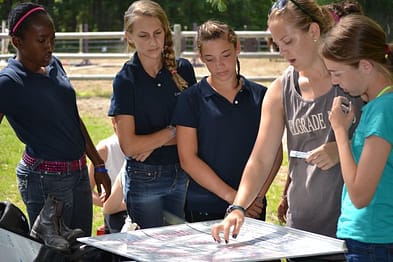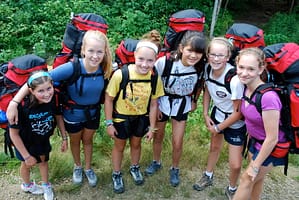
Interview with Lea Kone of Maine Camp Experience with Owner/Director, Pam Cobb
Self-esteem is such a buzzword these days. What do you think self-esteem means today?
You’re right, it’s almost an overused word. About ten years ago people began moving away from it and started using intentional youth development as a catch phrase. It was a phrase that meant helping kids develop in their youth — collaborative problem solving, initiative, creative thinking. A lot of things that schools are not necessarily teaching. So I think self-esteem morphed into intentional youth development, but now I feel like that, too, has been almost overused. Now 21st century skills has really become the new thing. It addresses the question: What are we teaching kids to help them become not only great citizens, but business, government, social leaders, etc.? I think camps help develop all of these skills because camp involves community, a support system that isn’t coddling, and expanded comfort zones.
In what ways do you see the self-esteem of campers change from the beginning to the end of a camp summer? And how does it change over multiple summers?
Parents say their child is more organized, takes the time to think through what’s coming up, and is prepared. I don’t know if every camp is like this, but at Runoia there’s not a counselor in between activities helping kids get ready. They have the responsibility of changing from a bathing suit into horse riding clothes, and hopefully they hang up their swimsuit to dry. A camper learns these logistical and organizational skills at camp.
There’s also a whole piece about taking care of other people. It’s about being the stand-up girl, helping others learn how to advocate for themselves, for yourself, learning who to ask for help or lobby for something that you want and are not getting — all without your parents doing it for you. I think parents really see how their daughter comes home and she makes her bed, how dinner is now run like a camp meal — everyone has to help set the table, clear the dishes, sweep the floor.
I think these moral imprints grow from summer to summer. The little campers learn how to brush their teeth, put their clothes away, get dressed. But when they get older they start to think outside of themselves. They think, “This girl needs help. She needs to know where to mail a letter,” or, “This camper doesn’t know how to get to the ropes course. I’m going to help her out.” Camp helps kids think about and do things for others.
And delayed gratification is a very real thing at camp. It’s the experience of living in a large community with a lot of other children. It’s the reality that you don’t get everything instantly and you don’t get everything that you want. I guess, in essence, you have to grow up at camp.
Activity-wise, which activities do you think grow self-esteem in campers?
I think different activities service different tools. When you look at progressive activities like archery, where you learn to shoot at 10 yards, and once you get past all the levels, you move to 15 yards and then 20 yards. It keeps getting harder. It’s like that in a lot of activities in camp. Tennis, riding, softball, canoeing, sailing. First you get the feel of sailing by being in the boat with people who are more experienced. Then you start to work the boat. You learn how to tie knots. Then you progress into skippering.

It’s the same with our wilderness trip program. Our younger campers start with shorter trips and then by the time they’re older, they’re doing longer trips and harder climbs. So I think there are a lot of ways to build skills, and then I think self-esteem growth occurs organically. “I want to climb higher.” “I want to shoot further.” “I want to solo a canoe.”
Also, having victories and defeats without your parents being there is important. If something doesn’t go well, you say, “Okay, that didn’t go so well. How can I make it better?” Your parents aren’t there to console you, to tell you you’re really great. Sharing victories and defeats with other adults outside of your family is a good thing.
Like finding your own voice…
Yes, that’s a great expression.
How do you see the approach to self-esteem changing in the future?
We could probably “Google” what’s next. But I think the 21st century skills are really good ones. People are coming out of the best colleges, but they are not able to succeed in collaborative problem solving or participate in things outside the norm. To allow someone else to be successful over your own ego-driven persona — that’s a big thing companies find people lacking, but camp is teaching these skills.
What is something you would say to parents as they prepare their kids for camp?
Camp is a microcosm of the world. It’s not utopia. There are struggles. But because of the ratio of adults to children — at MCE camps specifically — kids must overcome adversity. However, before camp, kids must get ready to go away. They must build skills by spending nights at a friend’s house, a relative’s house, making it through those new experiences so that when they get to camp they aren’t totally shocked. They must practice some independence beforehand.
How can camps promote the skills we mentioned throughout the year?
I think that parents can help their campers make their own decision about returning to camp and help them understand that it is a commitment and to stick with it. By addressing the things that they may be concerned with about returning to camp, we are helping children to work out their own problems and see the glass as half full. We don’t want to teach parents how to parent, but we want to encourage campers to stay in touch with their camp friends in meaningful ways, be it old-fashioned letter writing, texting or planning out of camp time together. Parents can remind campers to stay connected and help facilitate visits.
We have to remember, camp is a great place to try new things because there is a zero tolerance for shame or humiliation. Whether it’s singing a song in front of the whole camp, or acting in the talent show, or trying something new that you wouldn’t try at home because everyone else is already good at it. And at age 9 or 10, campers are getting an early experience of what it’s like to go off to college. It’s a very powerful thing to be disconnected from your family and then write or tell stories about your experiences once you get home.

